Cronologie
| 19.05.2025 |
The municipally owned bus operator, Transportes Colectivos do Barreiro (TCB), has announced plans to expand its fleet with the acquisition of 40 new all-electric buses. These will complement the 60 natural gas-powered buses currently in operation.
Details regarding the specific model, delivery timeline, and the date the new vehicles will enter service have not yet been disclosed. |
| Vizualizarea întregii cronologii |
Căutarea rapidă a vehiculului
Căutarea fotografiei după linie
Companii de transport cu tramvaie
Companii de transport cu autobuze electrice
| • |
Transportes Colectivos do Barreiro
Founded in 1957.

The municipality owned local bus operator announced on 19.05.2025. that 40 new all electric buses will be purchased. |
Lista modelelor
Vehicule fără fotografii |
| V |
Alsa Todi Metropolitana de Lisboa, Lda. · Carris Metropolitana
Founded on 05.11.2020, and integrated into the Carris Metropolitana network as of 01.04.2022.
 | | 
The operator of both regular and electric buses serves the municipalities of Alcochete, Moita, Montijo, Palmela, and Setubal, while also offering routes to Almada, Barreiro, Lisbon, Seixal and Sesimbra.
Since April 2022, it has held the concession rights to operate within the Carris Metropolitana network for these municipalities, covering area 4 of the network and managing the lines designated as 4xxx.
Rolling stock listed in Setubal. |
Lista modelelor
Vehicule fără fotografii |
|
Toate vehiculele din oraș |
Lista modelelor
Vehicule fără fotografii |
Fotografii noi
» Maps of MTS expansion project through Barreiro
» Maps of MTS expansion project through Barreiro
Informație
|
Information about municipality
|
|---|


|
Barreiro
Founded: 1521
Area: 36,39km2
Population: 78`359
Barreiro is a municipality located in the Setúbal District of Portugal, situated on the southern bank of the Tagus River, directly across from Lisbon. Though part of the Setúbal region, Barreiro also belongs to the Lisbon Metropolitan Area, offering a unique blend of suburban character with proximity to the capital. The municipality is well-connected by public transport, featuring regular ferry services across the Tagus to Lisbon and railway links that provide direct access to both Lisbon and Setúbal, making it a convenient location for commuters and travelers alike.
A significant aspect of Barreiro's transportation system is the integrated public transport hub created by the Terminal Fluvial do Barreiro and the nearby Estação Ferroviária do Barreiro. This hub enables smooth transfers between ferry services run by Transtejo & Soflusa, the Sado Line trains operated by Comboios de Portugal, and various local and inter-municipal bus routes managed by Carris Metropolitana and Transportes Coletivos do Barreiro. This arrangement ensures effective connectivity to multiple destinations within the Lisbon Metropolitan Area and the Setúbal Peninsula. Furthermore, the southern parish of Coina is connected via the Fertagus line, providing a direct link to Lisbon and Setúbal.
Within Barreiro, several parishes contribute to its local identity, including Barreiro e Lavradio, Santo André, Verderena, Alto do Seixalinho, and Santo António da Charneca. Each parish offers its own mix of residential areas, cultural sites, and local services, reflecting the municipality's diverse and vibrant character.
|
|
Tram (unfinished project)
|
|---|

Metro Transportes do Sul
Founded May 20th, 2002
Service started May 1st, 2007
www.mts.pt
|
The initial design of the Almada Metro Transportes do Sul system, proposed in 1995, included an expansion that would traverse the central areas of Seixal and Barreiro municipalities, ultimately reaching the center of Moita municipality.
As of 2024, the discussion for the extension project has gained renewed momentum, with an extension westward towards Costa da Caparica and a new proposal for an eastward expansion. The first phase of the eastward extension is anticipated to start from Corroios, traversing the central areas of Seixal and Barreiro before concluding at Alhos Vedros in Moita municipality. This phase could be developed as either Light Rail Transit (LRT) or Bus Rapid Transit (BRT). The second phase, proposed as BRT only, would commence at Alhos Vedros, moving through the central area of Moita and progressing further through Montijo and Alcochete municipalities.
|
|
Electric buses
|
|---|

Transportes Colectivos do Barreiro
Founded in 1957
www.cm-barreiro.pt/municipio/tcb-transportes-colectivos-do-barreiro/
|
Transportes Colectivos do Barreiro (TCB) is a bus operator owned by the local municipality, serving the Barreiro municipality and its parishes since 1957. In 2016, the service expanded to include Baixa da Banheira and Alhos Vedros, parishes in the adjacent municipality of Moita. While other local bus operators were either dissolved or merged into one of the four operators within the Carris Metropolitana network, TCB has continued to operate independently. TCB runs 20 routes, including 6 circular routes, 2 express routes, 2 night routes, 3 school routes, and 2 routes that operate only on weekends.
On May 19th, 2025, the operator announced plans to acquire 40 new all-electric buses to complement its existing fleet of 60 natural gas Caetano City Gold buses, although specific details have yet to be revealed.
|

Carris Metropolitana
Founded April 1st, 2022
www.carrismetropolitana.pt

Alsa Todi
Founded November 5th, 2020
|
The Carris Metropolitana network offers bus services throughout the Lisbon metropolitan area, featuring routes that operate within individual municipalities, connect neighbouring municipalities, or provide direct access to Lisbon.
The metropolitan area is divided into four zones, with Lisbon at the center, and each of the four licensed operators managing their respective areas while facilitating seamless travel across zones. These operators have assumed control of nearly all local routes established before 2022, ensuring a consistent level of service across the entire metropolitan region. Barreiro and Cascais are the only two municipalities that have maintained their own bus operators independent of the Carris Metropolitana network; however, by 2025, they do not operate electric buses.
Each route number in the Carris Metropolitana network consists of four digits, where the first two digits indicate the route's location. The first digit represents the network area (1, 2, 3, or 4), while the second digit denotes the route type (0, 1, 2, 3, or 4 for routes within a single municipality with each number indicating which municipality from this area; 5 for inter-municipal connections; 6 for routes linking Barreiro and Cascais; 7 and 8 for routes connecting to Lisbon; and 9 for routes extending beyond the Lisbon metropolitan area). The last two digits simply represent the route number, which may sometimes correspond to a local route established before 2022.
Barreiro, while not fully integrated into the Carris Metropolitana network due to its own bus operator, enjoys a strategic position between areas 3 and 4, which is reflected in its unique route numbering within the network (routes 36xx and 46xx). Transportes Sul do Tejo (from Almada serving area 3, operating routes 36xx) and Alsa Todi (from Setubal serving area 4, operating routes 46xx and 47xx) connecting Barreiro to adjacent municipalities and Lisbon. Only Alsa Todi utilizes Electric Buses.
|
|
|
Fotografie aleatorie
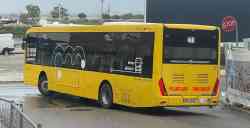
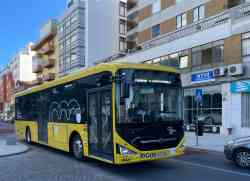 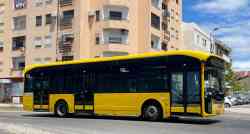 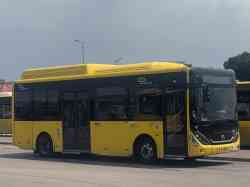  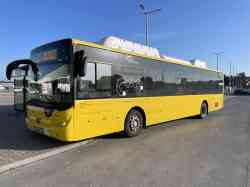 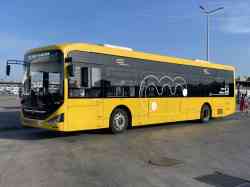
|
 Transportul electric urban
Transportul electric urban






























 |
| 




